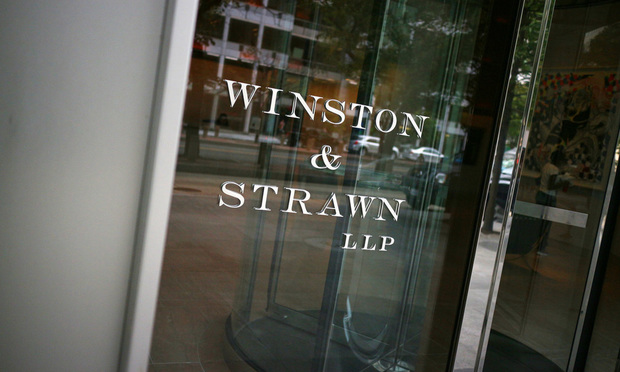Ex-Winston Partner Defeats Arbitration Bid in Gender Bias Suit
A California appeals court reversed a finding that would have forced Constance Ramos' gender bias allegations against Winston & Strawn into arbitration. Now the case will move forward publicly, in court.
November 06, 2018 at 02:38 PM
5 minute read

Siding with former Winston & Strawn income partner Constance Ramos, a California appellate panel has set aside an arbitration agreement that would have kept a gender bias case against the law firm out of court.
A three-judge panel at the first appellate district of the California Court of Appeal held on Friday that an arbitration pact Winston had tried to enforce as part of its partnership agreement was “unconscionable” and that the entire arbitration pact should be considered void. The decision comes more than a year after Ramos, an intellectual property specialist who now works at her own firm, Akira IP, lodged the suit, saying she faced gender discrimination and retaliation at Winston.
Ramos alleged that she was unfairly passed over for work and effectively forced out of the firm. Her suit is one of several brought in recent years by women partners at large law firms who claim they have been paid and treated unfairly compared with their male counterparts.
Previously, a trial court in San Francisco had sided with Winston on the arbitration issue, finding that Ramos had signed a partnership agreement that governed her claims against the firm. But the appeals court ruling on Friday reached the opposite result.
Among several specific issues the court had with the arbitration pact, the appeals court wrote that provisions in the agreement requiring Ramos to share in the costs of arbitration and pay her own legal fees were both unconscionable terms. The court also faulted Winston's agreement for its confidentiality provisions, which, the panel found, would restrict Ramos' ability to conduct informal interviews, as opposed to formal depositions, of potential witnesses in the case.
“Because it requires her to keep 'all aspects of the arbitration' secret, she would be in violation if she attempted to informally contact or interview any witnesses outside the formal discovery process,” the court wrote. “Such a limitation would not only increase Ramos's costs unnecessarily by requiring her to conduct depositions rather than informal interviews, it also defeats the purpose of using arbitration as a simpler, more time-effective forum for resolving disputes.”
Another portion of the appeals court's analysis focused on a key issue that will likely remain at the heart of the case as it moves forward: whether Ramos is effectively an employee because she was a nonequity “income” partner at Winston.
The appeals court stopped short of answering that question. But it also determined there was enough of a power imbalance with respect to the arbitration agreement that it should be analyzed under a 2000 state Supreme Court decision, Armendariz v. Foundation Health Psychcare Services, which found against arbitration agreements that limit the scope of an employee's remedies under the employment laws relevant to the case.
Here, the appeals court wrote, the wording of Winston's arbitration pact would “preclude the arbitrators from providing remedies that would otherwise be available in a court of law” under California's Fair Employment and Housing Act (FEHA) and other laws invoked in Ramos' gender bias suit.
“The record demonstrates Winston was in a superior bargaining position vis-à-vis Ramos akin to that of an employer-employee relationship, and there is no evidence in this record that Ramos had an opportunity to negotiate the arbitration provision,” the appeals court wrote. The court later concluded, “As the express language of the agreement prevents Ramos from obtaining remedies under her statutory claims, the provision is unenforceable.”
Orrick, Herrington & Sutcliffe partner Lynne Hermle, no stranger to defending high-profile gender bias cases in the Bay Area, argued the appeal for Winston. She was not immediately available for comment on Tuesday.
Ramos' lawyer, Noah Lebowitz, who runs his own employee rights firm in Berkeley, said in an interview on Tuesday that he and his client were very happy with the appeals court's decision.
“All my client had sought from the beginning of this case is to have the ability to bring her claims to a jury after discovery and with all remedies available to her,” Lebowitz said. “We think it is important that claims of pay equity and equal pay are brought in open court because the wage gap will never be closed and eliminated unless there is a public reckoning of the situation.”
Read More:
Winston & Strawn Wins Bid to Arbitrate Gender Bias Suit
Big Law's Latest Gender Bias Plaintiff is a Former Obama Classmate
That Makes Five: Winston & Strawn Suit Adds To Growing List of Gender Bias Claims
This content has been archived. It is available through our partners, LexisNexis® and Bloomberg Law.
To view this content, please continue to their sites.
Not a Lexis Subscriber?
Subscribe Now
Not a Bloomberg Law Subscriber?
Subscribe Now
NOT FOR REPRINT
© 2025 ALM Global, LLC, All Rights Reserved. Request academic re-use from www.copyright.com. All other uses, submit a request to [email protected]. For more information visit Asset & Logo Licensing.
You Might Like
View All
Meta agrees to pay $25 million to settle lawsuit from Trump after Jan. 6 suspension
4 minute read
How We Won It: Latham Secures Back-to-Back ITC Patent Wins for California Companies
6 minute read
Trending Stories
- 1Gunderson Dettmer Opens Atlanta Office With 3 Partners From Morris Manning
- 2Decision of the Day: Court Holds Accident with Post Driver Was 'Bizarre Occurrence,' Dismisses Action Brought Under Labor Law §240
- 3Judge Recommends Disbarment for Attorney Who Plotted to Hack Judge's Email, Phone
- 4Two Wilkinson Stekloff Associates Among Victims of DC Plane Crash
- 5Two More Victims Alleged in New Sean Combs Sex Trafficking Indictment
Who Got The Work
J. Brugh Lower of Gibbons has entered an appearance for industrial equipment supplier Devco Corporation in a pending trademark infringement lawsuit. The suit, accusing the defendant of selling knock-off Graco products, was filed Dec. 18 in New Jersey District Court by Rivkin Radler on behalf of Graco Inc. and Graco Minnesota. The case, assigned to U.S. District Judge Zahid N. Quraishi, is 3:24-cv-11294, Graco Inc. et al v. Devco Corporation.
Who Got The Work
Rebecca Maller-Stein and Kent A. Yalowitz of Arnold & Porter Kaye Scholer have entered their appearances for Hanaco Venture Capital and its executives, Lior Prosor and David Frankel, in a pending securities lawsuit. The action, filed on Dec. 24 in New York Southern District Court by Zell, Aron & Co. on behalf of Goldeneye Advisors, accuses the defendants of negligently and fraudulently managing the plaintiff's $1 million investment. The case, assigned to U.S. District Judge Vernon S. Broderick, is 1:24-cv-09918, Goldeneye Advisors, LLC v. Hanaco Venture Capital, Ltd. et al.
Who Got The Work
Attorneys from A&O Shearman has stepped in as defense counsel for Toronto-Dominion Bank and other defendants in a pending securities class action. The suit, filed Dec. 11 in New York Southern District Court by Bleichmar Fonti & Auld, accuses the defendants of concealing the bank's 'pervasive' deficiencies in regards to its compliance with the Bank Secrecy Act and the quality of its anti-money laundering controls. The case, assigned to U.S. District Judge Arun Subramanian, is 1:24-cv-09445, Gonzalez v. The Toronto-Dominion Bank et al.
Who Got The Work
Crown Castle International, a Pennsylvania company providing shared communications infrastructure, has turned to Luke D. Wolf of Gordon Rees Scully Mansukhani to fend off a pending breach-of-contract lawsuit. The court action, filed Nov. 25 in Michigan Eastern District Court by Hooper Hathaway PC on behalf of The Town Residences LLC, accuses Crown Castle of failing to transfer approximately $30,000 in utility payments from T-Mobile in breach of a roof-top lease and assignment agreement. The case, assigned to U.S. District Judge Susan K. Declercq, is 2:24-cv-13131, The Town Residences LLC v. T-Mobile US, Inc. et al.
Who Got The Work
Wilfred P. Coronato and Daniel M. Schwartz of McCarter & English have stepped in as defense counsel to Electrolux Home Products Inc. in a pending product liability lawsuit. The court action, filed Nov. 26 in New York Eastern District Court by Poulos Lopiccolo PC and Nagel Rice LLP on behalf of David Stern, alleges that the defendant's refrigerators’ drawers and shelving repeatedly break and fall apart within months after purchase. The case, assigned to U.S. District Judge Joan M. Azrack, is 2:24-cv-08204, Stern v. Electrolux Home Products, Inc.
Featured Firms
Law Offices of Gary Martin Hays & Associates, P.C.
(470) 294-1674
Law Offices of Mark E. Salomone
(857) 444-6468
Smith & Hassler
(713) 739-1250







